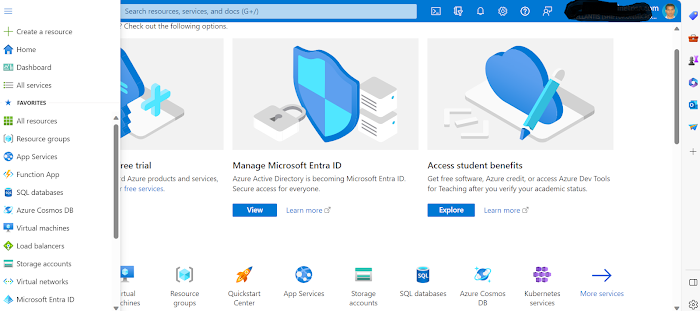Microsoft Cloud / Windows Cloud - commonly referred to as Azure, is a cloud computing platform and infrastructure service provide by Microsoft. As a cloud platform from Microsoft it provides a wide range of different cloud-based services, including computing, analytics, storage and networking.
Azure allows organizations to build, deploy, and manage applications and services through Microsoft-managed data centers located around the world.
In other words, Azure is a world of unlimited possibilities. It doesn't matter if you have a large enterprise or a small business, Azure provides a platform to build your applications that can leverage the cloud to meet the needs of your business.

Azure is an open and flexible cloud platform that enables you to quickly build, deploy, and manage applications across a global network of Microsoft-managed datacenters. You can build applications using any language, tool, or framework and you can integrate your public cloud applications with your existing IT Environments.
Here are some key aspects of Azure:
1. Infrastructure as a Service (IaaS): Azure offers virtual machines (VMs) that can run Windows or Linux, allowing users to have full control over the virtualized infrastructure.
2. Platform as a Service (PaaS): Azure provides a platform for developers to build, deploy, and manage applications without worrying about the underlying infrastructure. Azure App Service, for example, allows developers to deploy web applications easily.
3. Containers and Kubernetes: Azure supports containerization technologies like Docker and offers Azure Kubernetes Service (AKS) for container orchestration.
4. Storage: Azure offers various storage services, including Blob storage for unstructured data, Table storage for NoSQL data, Queue storage for message-based communication, and File storage for file shares.
5. Databases: Azure provides managed database services, including Azure SQL Database, Azure Cosmos DB, and Azure Database for MySQL, PostgreSQL, and more.
6. Analytics and Big Data: Azure offers services for data analytics, machine learning, and big data processing, including Azure HDInsight, Azure Databricks, and Azure Synapse Analytics.
7. IoT (Internet of Things): Azure IoT Hub and Azure IoT Central enable the development of IoT solutions, allowing devices to connect to the cloud for data analysis and management.
8. DevOps and Development Tools: Azure DevOps Services and Azure DevTest Labs provide tools for software development, testing, and deployment.
9. AI and Machine Learning: Azure offers services for artificial intelligence and machine learning, such as Azure Machine Learning, Azure Cognitive Services, and Azure Bot Service.
10. Security and Identity: Azure includes features for identity and access management, security monitoring, and compliance, such as Azure Active Directory, Azure Security Center, and Azure Policy.
11. Networking: Azure provides a range of networking services, including virtual networks, load balancers, and Azure VPN Gateway for connecting on-premises networks to Azure.
12. Hybrid Cloud: Azure supports hybrid cloud scenarios, allowing businesses to integrate on-premises infrastructure with cloud resources.
13. Global Presence: Azure has a global presence with data centers located in multiple regions, which enables users to deploy applications and services closer to their target audience for better performance and compliance with data residency requirements.
14. Open Windows Azure: provides a set of cloud services that allow you to build and deploy cloud-based applications using almost any programming language, framework, or tool.
15. Flexible Windows Azure: provides a wide range of cloud services that can let you do everything from hosting your company’s website to running big SQL databases in the cloud. It also includes different features that can help deliver high performance and low latency for cloud-based applications.
16. Microsoft-managed Windows Azure: services are currently hosted in several datacenters spread across the United States, Europe, and Asia. These datacenters are managed by Microsoft and provide expert global support on a 24x7x365 basis.
Azure services:
Azure provides businesses with four basic categories of cloud-based services:
- Compute services
- Network services
- Data services
- App services
1. Compute Services: provides the processing power required for cloud applications to run. Azure offers different types of compute services; Virtual Machines, Web Sites, Cloud Services, Remote Apps, Azure Kubernetes Service, Azure Batch, Mobile Services etc.
2. Network services: provides different network services which builds a connectivity between on-premises applications delivered to users and datacenters. Azure offers different types of network services; Virtual Network, Traffic Manager, Virtual WAN, Azure DNS, VPN Gateway, Route Server, Peering Service, ExpressRoute etc.
3. Data services: provides the platform of storing, managing, safeguarding, analyzing, and reporting business data. The different types of Data services available in Azure are;
Data Management,
Business Analytics,
Backup & Recovery,
Azure Data Lake,
Azure SQL Database,
Data Factory,
Azure Front Door etc.
4. App services: provide services to create web applications. you can build, deploy, host, integrate, scale your own apps using languages like .NET, .NET Core, Java, Node.js, PHP, and Python etc. The different types of App services available in Azure are;
Media Services,
Active Directory,
Multifactor Authentication,
BizTalk Services,
API & mobile App services,
DevOps Integration,
Custom Domains,
CI/CD,
Serverless code etc.
End-to-end Architecture of Azure: Microsoft Azure is widely used by businesses of all sizes from startups to large enterprises for a variety of purposes including web hosting, data storage, development and testing, disaster recovery, DevOps and more.
If you ask the question, “What is Azure?” the best answer might be - Azure is anything you want it to be.
It competes with other major cloud providers like Amazon Web Services (AWS) and Google Cloud Platform (GCP).










Comments
Post a Comment